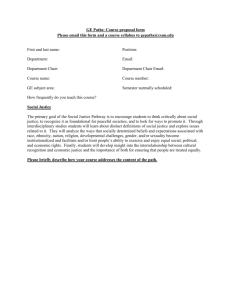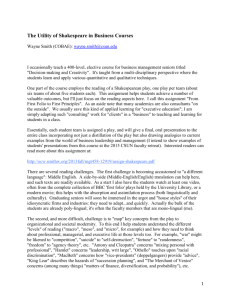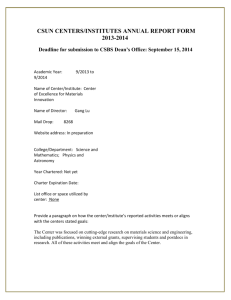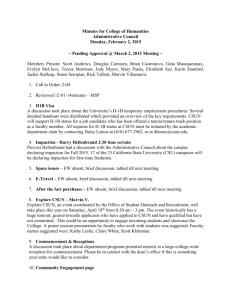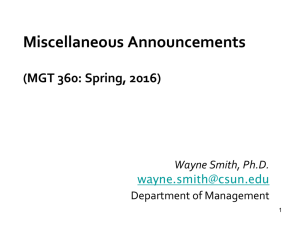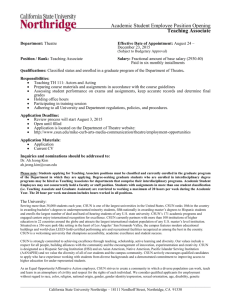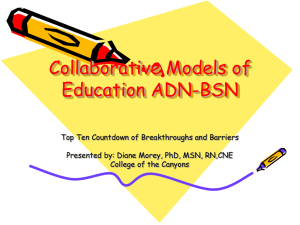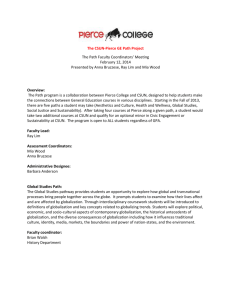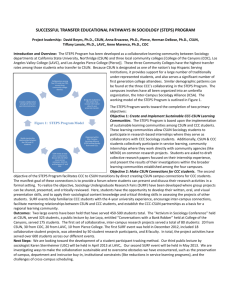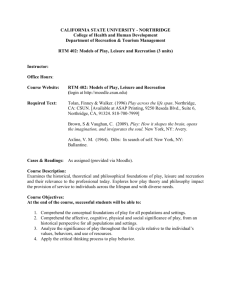2014-10-15 - California State University, Northridge
advertisement
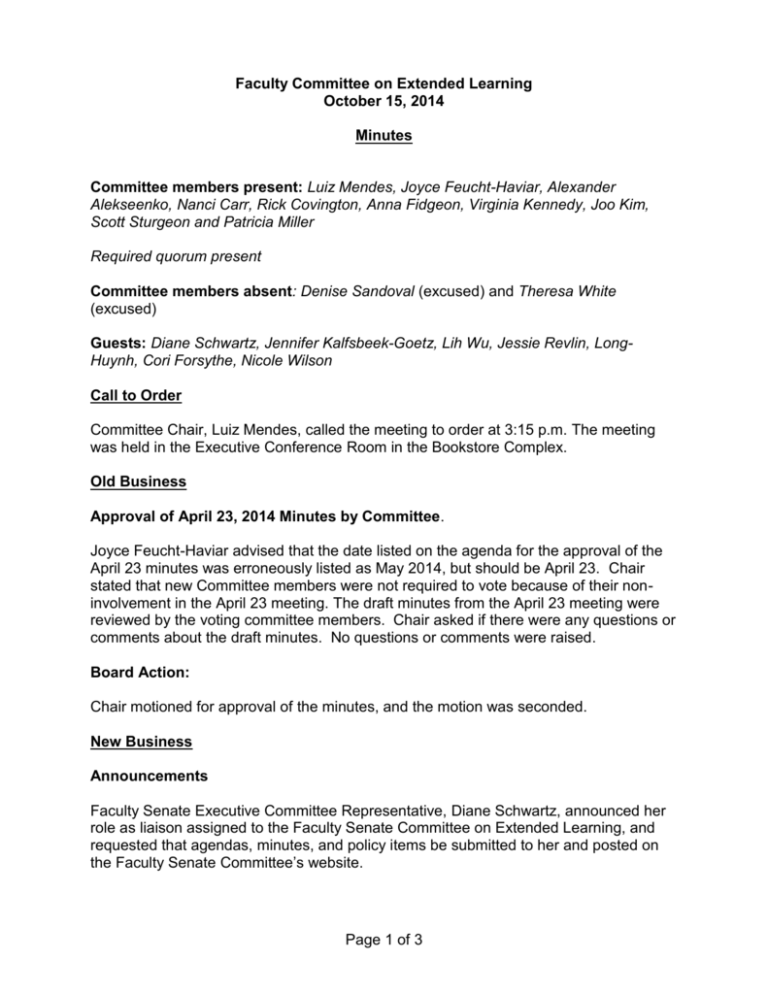
Faculty Committee on Extended Learning October 15, 2014 Minutes Committee members present: Luiz Mendes, Joyce Feucht-Haviar, Alexander Alekseenko, Nanci Carr, Rick Covington, Anna Fidgeon, Virginia Kennedy, Joo Kim, Scott Sturgeon and Patricia Miller Required quorum present Committee members absent: Denise Sandoval (excused) and Theresa White (excused) Guests: Diane Schwartz, Jennifer Kalfsbeek-Goetz, Lih Wu, Jessie Revlin, LongHuynh, Cori Forsythe, Nicole Wilson Call to Order Committee Chair, Luiz Mendes, called the meeting to order at 3:15 p.m. The meeting was held in the Executive Conference Room in the Bookstore Complex. Old Business Approval of April 23, 2014 Minutes by Committee. Joyce Feucht-Haviar advised that the date listed on the agenda for the approval of the April 23 minutes was erroneously listed as May 2014, but should be April 23. Chair stated that new Committee members were not required to vote because of their noninvolvement in the April 23 meeting. The draft minutes from the April 23 meeting were reviewed by the voting committee members. Chair asked if there were any questions or comments about the draft minutes. No questions or comments were raised. Board Action: Chair motioned for approval of the minutes, and the motion was seconded. New Business Announcements Faculty Senate Executive Committee Representative, Diane Schwartz, announced her role as liaison assigned to the Faculty Senate Committee on Extended Learning, and requested that agendas, minutes, and policy items be submitted to her and posted on the Faculty Senate Committee’s website. Page 1 of 3 Presentation: Briefing on Degree and Options at CSUN Joyce Feucht-Haviar addressed the Committee with a briefing on CSUN’s current approach to developing options. Some departments do not have common core courses associated with the main degree (even though CSUN’s options are approved and delegated by the campus). The inconsistencies can be attributed to many factors that include the process in obtaining approval of an option by the Chancellor, which process does not include a close examination on proposed options that are not common core courses with the main degree, and apparently this oversight has been the practice for decades. Further, the Chancellor and CSUN have not yet decided upon a clear definition of “option”, so the obtaining of degrees with options not related to majors have been circumvented pending a clear definition. In sum, this can cause problems with a student not knowing exactly what he/she is getting, i.e., a psychology degree with a questionable option. Rick Covington commented that the Chancellor’s concern is that a program is not mislabeled. Maggie Shiffar and Elizabeth Adams will be reviewing the baccalaureate degrees for consistency and any option problems. Joyce Feucht-Haviar suggested that the creation of a core of five courses in common with the main degree, and the options not associated with the main degree can possibly become a whole new degree. Alexander Alekseenko commented that math has courses in common, but sometimes it requires a separate degree. Chair asked what led to the revelation of the inconsistencies. Joyce Feucht-Haviar stated that the inconsistencies were found during the extended learning audit when questions about core courses associated with the main degree were raised. Presentation: Program Updates Jennifer Kalfsbeek-Goetz discussed ELPS Higher Education going self-support and online. The MA in Education with an option in Higher Education is a program offered out of the College of Education and the Department of Education Leadership and Policy Studies (ELPS). The self-support offering is intended to be offered fully online to the non-traditional, midcareer student audience from outside of CSUN’s region. The program consists of a 33-unit master’s degree that can be completed in a cohort in five consecutive semesters or 21 months. The degree will prepare students for jobs in public and private institutions of higher education, and according to the labor market outlook, the demand is favorable because most programs lack the resources needed to go completely online, competitors have not yet reached the online market, and a master’s degree is more valuable than a certificate. Jennifer Kalfsbeek-Goetz also discussed notification of HUMA going online. CSUN’s master’s degree in Humanities consists of a two-year, 11-courses and 33-units program, and includes participation of faculty from CSUN’s College of Social and Behavioral Sciences and HUMA. It is designed for working professionals and prepares graduates for advancement in the California K-12 system; teaching in California community colleges and many U.S. universities; work in nonprofit or private arts organizations; and innovation and problem-solving in business and service sectors. The use of distinguished speakers (one person per semester, one pre-recorded and Page 2 of 3 one live session) would be a significant benefit to the program, but as of yet no speakers have been lined up. Presentation: Administration, Finance & Support Services Lih Wu discussed our types of students: midcareer and traditional comprising the (external), and our faculty and staff comprising the (internal). She emphasized the importance of thorough customer service, liking it to an essential facet in achieving our goals and success. She also discussed CSU policies and net revenues (Tab 7 in Faculty Senate Extended Learning book), and faculty pay, which is determined by a chart in compliance with CSU polices. She also emphasized that Administration adheres strictly in compliance with CSU policies and guidelines, and that each program has its own budget, and all net revenues are shared with CSUN’s colleges. Presentation: Marketing and Communications Jessie Revlin discussed the marketing department’s work on thirty distinct programs. She described their work being focused on marketing programs that show how students benefit from our programs and emphasize “why they should choose CSUN over other schools and programs”. Adjournment Having no further business to discuss, Chair motioned to adjourn meeting and the motion was seconded. Meeting was adjourned at 4:41 p.m. (No policy changes were discussed or recommended during this meeting.) Prepared by Cori Forsythe Page 3 of 3
